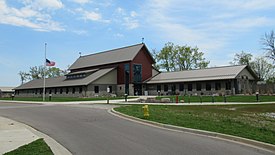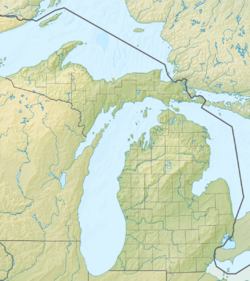| Detroit River International Wildlife Refuge | |
|---|---|
IUCN category IV (habitat/species management area) | |
 John D. Dingell Jr. Visitor Center in Trenton | |
| Location | Detroit River / West Lake Erie |
| Coordinates | 42°13′N 83°08′W / 42.217°N 83.133°W |
| Area | 5,868 acres (23.75 km2)[1] |
| Established | December 21, 2001 |
| Governing body | |
| Website | Official website |

The Detroit River International Wildlife Refuge is the only international wildlife refuge in North America.[2] Established in 2001 and managed jointly by the United States Fish and Wildlife Service and the Canadian Wildlife Service, it is located in a major metropolitan area. The Detroit River International Wildlife Refuge is one of over 540 National Wildlife Refuges managed by the U.S. Fish and Wildlife Service within the Department of the Interior. It occupies 7.88 square miles (20.41 km2) of scattered property but has drawn boundaries for further expansion.[3]
The Detroit River International Wildlife Refuge consists primarily of coastal wetlands, several islands in the Detroit River, and waterfront parks. The refuge includes islands, marshes, shoals, and waterfront lands along 48 miles (77 km) of the Detroit River and Western Lake Erie shoreline. It also includes Humbug Marsh, a wetland in southeastern Wayne County, which is classified as a wetland of international importance.
- ^ "National Wildlife Refuges - Acres by State and Unit" (PDF). US Fish and Wildlife Service. Retrieved 6 September 2016.
- ^ "Detroit River International Wildlife Refuge". U.S. Fish and Wildlife Service. 2010. Retrieved March 17, 2010.
- ^ "Detroit River-Western Lake Erie Basin Indicator Project". U.S. Environmental Protection Agency. 2009. Retrieved March 17, 2010.


